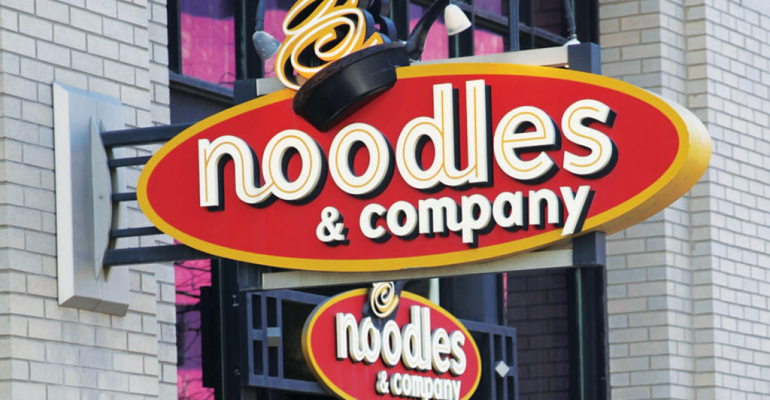Noodles & Company, struggling with financial losses and hit with a data breach last year, is putting much of its future into franchising.
The Denver-based fast-casual operator has contracted with the investment banking firm Cypress Group to sell company-owned restaurants to franchisees. Noodles & Company suggested that franchising would play a bigger role in development in the coming years.
“We’re over 85-percent company owned,” Noodles & Company interim CEO Dave Boennighausen said on a conference call Thursday. “We expect franchise restaurants will occupy a larger proportion of our restaurant portfolio.”
As of Sept. 27, Noodles & Company operated 455 locations and franchised 73 units.
The comments come as Noodles & Company plans to close 55 underperforming locations in the first half of the year. The operator is also slowing unit development, with plans to open 12 to 15 company-owned restaurants, mostly early in the year.
That’s a substantial reduction from past years. In the first three months of 2016, Noodles & Company opened 34 company-owned units.
The locations the company plans to build this year will be in “lower-risk markets with strong brand awareness and proven success,” Boennighausen said.
Executives suggested that closing the underperforming restaurants would go a long way on their own toward righting Noodles & Company’s financial ship.
The closed restaurants have average unit volumes of $700,000, while a typical Noodles & Company location generates just under $1.1 million.
Low-unit-volume locations lose money, with 20-percent loss margins. Without those restaurants, its restaurant contribution margin of 11.5 percent to 12 percent would be 280 basis points higher, the company said.
The locations to be closed are in newer markets, where the brand isn’t as well known.
“Many of the restaurants were opened recently in newer markets, where brand awareness is not strong and staffing is challenging,” Boennighausen said.
The locations slated to close represent more than 10 percent of Noodles & Company’s 528 units. Still, such a plan is not unusual. Several restaurant chains in recent years have closed locations, often aggressively, in a bid to reset business and offset weak sales.
Such closures often yield strong results. In 2013, Qdoba Mexican Eats announced plans to close 67 company-owned restaurants, more than 10 percent of that burrito chain. Same-store sales have been generally strong in the years since.
In addition to the 55 closures, this week Noodles & Company sold preferred shares and the rights to buy more stock at a set price to existing shareholder L Catterton, raising $18.5 million in the process. L Catterton now owns nearly 35 percent of Noodles & Company stock, according to SEC filings.
The funds will be used toward costs associated with the closures, expected to cost Noodles & Company $24 million to $29 million in cash in order to pay off broken leases, broker fees and other costs.
In addition, a data breach last year is expected to cost the company $11 million.
The stock sale doesn’t come close to raising that kind of cash. And so the company also announced that it plans to hold a secondary stock offering in the hopes of raising $32 million.
Noodles & Company stock fell more than 5 percent on Friday.
The moves come as Noodles & Company reels from persistently weak same-store sales and increasingly deep financial losses. As part of its strategic plan announced Thursday, the company renegotiated a credit deal with its lenders to give it financial flexibility by easing some financial covenants that are part of its lending deal.
In the first three quarters of 2016, Noodles & Company lost $26.3 million, down from losses of $9.5 million in the same period in 2015. Same-store sales had fallen in each of the past six quarters, including a 1.3-percent decline in the fourth quarter.
Noodles & Company’s strategy to improve sales involves menu simplification and a focus on core menu items. The company has streamlined the menu from 28 items to 19, and eliminated its sandwich line.
Menu reductions are aimed at speeding and improving service while saving on food and labor costs. Boennighausen said on the call that Noodles & Company showed “significant improvement” in guest satisfaction scores in the fourth quarter, which he called a leading indicator.
Noodles & Company is planning to test in Colorado and Kansas City several initiatives involving food quality, menu, operations and service. The company is developing a loyalty program and is working to improve online ordering. The company is also testing “guest bussing,” which could reduce labor and increase store cleanliness.
“These initiatives can and will have significant impact on several facets of the business,” Boennighausen said. “I’m as confident as ever in the future of Noodles.”
Contact Jonathan Maze at [email protected]
Follow him on Twitter: @jonathanmaze





